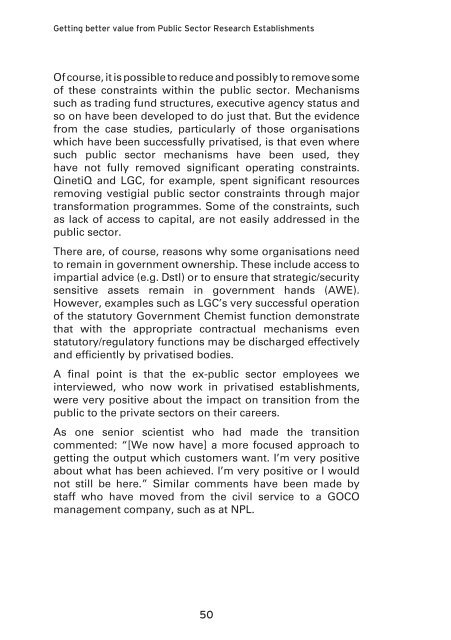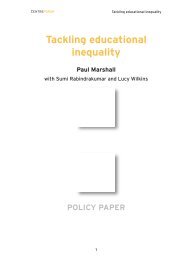Getting better value from public sector research ... - CentreForum
Getting better value from public sector research ... - CentreForum
Getting better value from public sector research ... - CentreForum
Create successful ePaper yourself
Turn your PDF publications into a flip-book with our unique Google optimized e-Paper software.
<strong>Getting</strong> <strong>better</strong> <strong>value</strong> <strong>from</strong> Public Sector Research Establishments<br />
Of course, it is possible to reduce and possibly to remove some<br />
of these constraints within the <strong>public</strong> <strong>sector</strong>. Mechanisms<br />
such as trading fund structures, executive agency status and<br />
so on have been developed to do just that. But the evidence<br />
<strong>from</strong> the case studies, particularly of those organisations<br />
which have been successfully privatised, is that even where<br />
such <strong>public</strong> <strong>sector</strong> mechanisms have been used, they<br />
have not fully removed significant operating constraints.<br />
QinetiQ and LGC, for example, spent significant resources<br />
removing vestigial <strong>public</strong> <strong>sector</strong> constraints through major<br />
transformation programmes. Some of the constraints, such<br />
as lack of access to capital, are not easily addressed in the<br />
<strong>public</strong> <strong>sector</strong>.<br />
There are, of course, reasons why some organisations need<br />
to remain in government ownership. These include access to<br />
impartial advice (e.g. Dstl) or to ensure that strategic/security<br />
sensitive assets remain in government hands (AWE).<br />
However, examples such as LGC’s very successful operation<br />
of the statutory Government Chemist function demonstrate<br />
that with the appropriate contractual mechanisms even<br />
statutory/regulatory functions may be discharged effectively<br />
and efficiently by privatised bodies.<br />
A final point is that the ex-<strong>public</strong> <strong>sector</strong> employees we<br />
interviewed, who now work in privatised establishments,<br />
were very positive about the impact on transition <strong>from</strong> the<br />
<strong>public</strong> to the private <strong>sector</strong>s on their careers.<br />
As one senior scientist who had made the transition<br />
commented: “[We now have] a more focused approach to<br />
getting the output which customers want. I’m very positive<br />
about what has been achieved. I’m very positive or I would<br />
not still be here.” Similar comments have been made by<br />
staff who have moved <strong>from</strong> the civil service to a GOCO<br />
management company, such as at NPL.<br />
50





